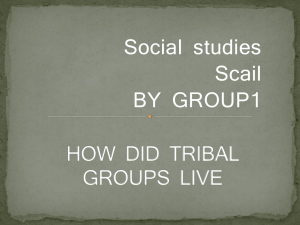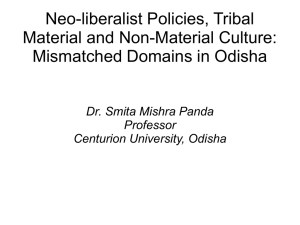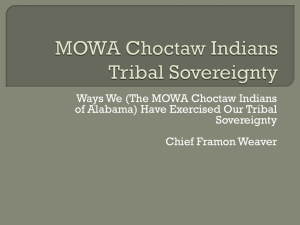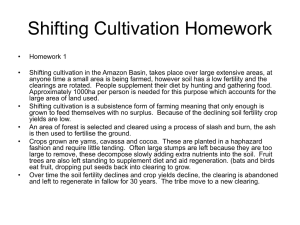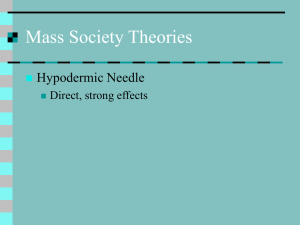Tribals,dikus and the vision of a golden age
advertisement
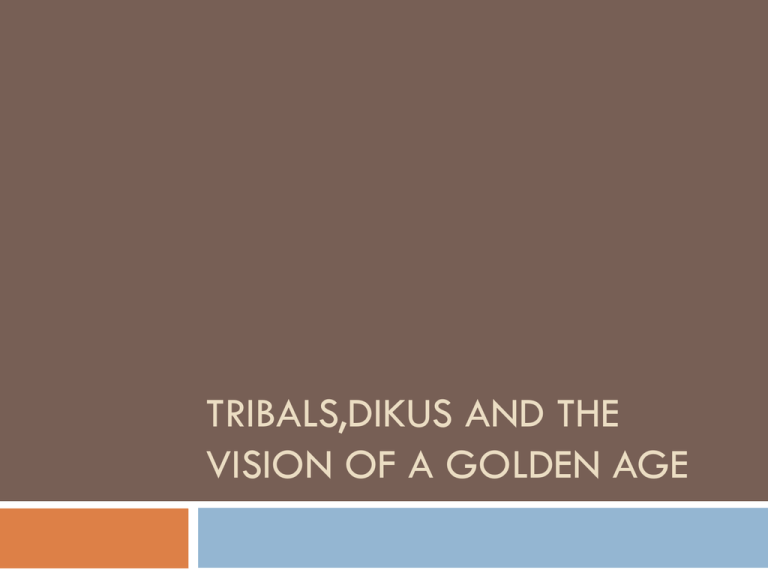
TRIBALS,DIKUS AND THE VISION OF A GOLDEN AGE module 1 tribal groups 2 forest laws 3 trade What problems did birsa set out to solve? Who were the outsiders? How did they enslave the people of this area ? What was happening to the forest people under the british? How did it change their lives? lets answer all these questiOns………… Jhum cultivation this type of cultivation is usually found in forests and hilly areas Some were hunter’s and gatherer’s they hunted deer, pig etc and gathered for their survival Some were herderer’s many tribal's lived by herding and grazing animals they are nomads Problem of British with shifting cultivation? They wanted shifting cultivators to settle down and become peasants As people engaged in shifting cultivation move around a lot so calculating tax is very hard Settled cultivation in those areas where water was scarce. Jhum cultivators who were forced to take up settled cultivation suffered , because their fields hardly gave good yield Shifting cultivation How did colonial rule affect tribal lives? During pre-colonial time tribal chiefs enjoyed many administrative and influencing rights, but during the colonial period there was a loss of power for the tribal chiefs they had to obey British law and the government restricted the rights of the tribal chiefs. What happened to the shifting cultivators? They wanted the tribal's to settle down. British government wanted tax therefore they wanted tribal's to settle down as it is easier to calculate tax. Settled cultivation was not successful were water is scarce and soil is dry. Facing widespread protests, the British had to ultimately allow them the right to carry on shifting cultivation in some parts of the forests. Forests law and their impact The British extended their over all forests and declared that forests were state property. Some forests were classified as reserve forests which was used to produce timber which the British wanted The colonial officials allowed some land for hum cultivation that they would provide labor for the forests department for looking after forests. impact:many tribal groups reacted against the colonial forest laws . they disobeyed the new rules , continued with the practices that were declared illegal . Such was the revolt of songram sangam of 1906 in assam many people for example like moneylenders, traders for purchasing raw goods and lending money These traders made huge profits but only a meager amount reached the producers. The condition of people who went to towns for work was not also better. They were paid low wages, and prevent them from returning home. Throughout the nineteenth and twentieth centuries tribal's rebelled against the forest laws . the kolas rebelled in 1831-32 Santhal rose in revolt in 1855 The bastar rebellion in central India broke out in 1910 . Warli revolt in Maharashtra on 1940 Birsa munda-an immortal legacy In 1895 bursa urged his followers to recover the past glory, a golden agewere the tribals held their heads high He talked of a goden past were mundas led a good life, constructed embankments, tapped natural springs, planted trees and orchards, practised cultivation to earn their living. As the movement spread the british officials decided to act. They arrested birsa in 1895, convicted him on charges of rioting and jailed him for 2 years. When birsa was released in 1897 he began to gather support against the british by using traditional methods They attacked police stations and churches, and raided the property of moneylenders and zamindars. They raised the white flag as a symbol of birsa raj. In 1900 birsa munda died of cholera and the movement faded out. Birsa mundA Significance of the movement of birsa munda It showed that the tribals could protest against injustice and express their dissatisfaction over the colonial rule It introduced laws so that the govt could not take away the land of the tribals questiOns What did birsa munda refer to as “the golden age”? What happened to jhum cultiators during the colonial period? What happened to tribal cheifs during the colonial period? How were the lives of the tribals affected by the laws imposed by the colonial government? How were the tribals exploited by the colonial officers? In what way was the movement of birsa munda significant ? mcQ The british described the tribal people as The method of sowing seeds in jhum cultivation is known as The tribals cheifs got tittles in central india under the british settlements. Tribals went to work in the of assam and the in bihar. Birsa was arrested in year on charges of rioting and jailed him for 2 years.

